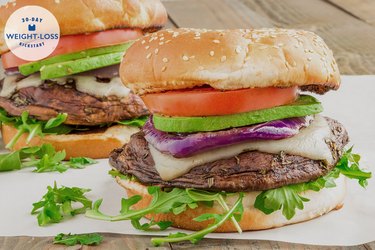
If you're looking to drop a few pounds, you may have noticed that there's a seemingly endless supply of weight-loss tips and tricks out there that go far beyond the "eat less, move more" mantra. But how do you know which advice is safe — and will actually move the scale?
We scoured the research and assembled the most intriguing weight-management hacks you may not have heard before, all grounded in sound science. (Translation: No fad diets here.) Check out these 13 strategies that really work.
1. Burn Calories Doing Everyday Activities
"NEAT" — which stands for nonexercise activity thermogenesis — is a simple concept that can lead to weight loss. It refers to the energy expended during typical daily activities like walking, standing and even fidgeting. This type of movement may help you burn several hundred additional daily calories above your baseline, according to an April 2015 research review in Mayo Clinic Proceedings.
This doesn't mean you can fidget instead or doing your sweaty workouts. But it does mean that it can be helpful to find ways to boost movement during the times you might normally be sitting at work, watching TV or just exercising your thumbs on a smart device.
So opt for a standing desk, take the stairs when they're right next to the escalator or use the excuse to paint and redecorate your bedroom, the latter of which can burn up to 200 calories per hour.
Read more: 10 Creative Hacks to Cut Down on Your Sitting Time
2. Resist Distractions at Dinnertime

"I think it's really important for everyone to pay attention to their food," says Sarah Pflugradt, RDN, author of You Get One Body. "In the United States, we are fast and distracted eaters. Sometimes, all it takes is to slow down and think about each food we are eating."
Each time you sit down to eat, ask yourself why you are eating that particular food, says Pflugradt. "Is it good for your bones or your muscles, or does it make you feel good? All are valid reasons for eating."
Science supports this idea, too. A review of 19 previous studies, published in the January 2015 issue of Psychosomatic Medicine, found that 13 of those studies linked mindfulness-based eating strategies to significant weight loss. The review authors weren't able to say exactly how or how much mindfulness acted as a mechanism for weight loss, and they say that more research is still needed to better understand this relationship. But the takeaway? It's worth paying closer attention to what's going in your mouth at mealtimes.
3. Swap Mushrooms for Red Meat
Want to lose seven pounds? One of the most logical ways to lose that weight is to simply eat fewer calories than your body needs. But just eating less is not necessarily the answer to long-term weight loss.
One of the more intriguing, delicious and effective ways to cut calories without actually eating less is to swap mushrooms in place of red meat. The results of a small December 2013 Appetite study, involving 73 adults with obesity, suggest that doing so could lead to a reduction of calories, body weight, body fat, body mass index, waist circumference and more.
Participants in that study who followed a mushroom diet lost an average of seven pounds — and they kept it off for the entire year they were monitored. So fire up the grill and toss on a portobello for a delicious, sizzling mushroom "steak."
Ready to Lose Weight?
Set yourself up for success with more from our 30-Day Weight-Loss Kickstart.
4. Eat Breakfast for Dinner
"One helpful tip is to think about restructuring your daily meals," says Pflugradt. "Instead of making dinner the heaviest meal, switch it to breakfast. Keep lunch the same and eat a lighter dinner."
While there hasn't been a lot of research on this exact strategy, a 93-person study published in the December 2013 issue of Obesity found that women with obesity who ate a 700-calorie breakfast and a 200-calorie dinner lost more weight and felt less hungry throughout the day than those who ate a 200-calorie breakfast and a 700-calorie dinner.
A June 2018 paper published in Nutrition Bulletin also notes that the timing of calorie intake does appear to have a significant effect on weight loss, calorie consumption and metabolism. "Growing evidence suggests some truth to the adage 'Breakfast like a king and dine like a pauper,' with meal timing appearing to influence energy balance and bodyweight," the authors wrote.
And the evidence continues to pile up: A small, 16-person study published February 2020 in the Journal of Clinical Endocrinology & Metabolism found that people who eat a big breakfast may burn twice as many calories as those who eat a bigger dinner. The researchers also concluded that eating a low-calorie breakfast actually increased appetite, specifically for sweets, which could lead to junk-food cravings and weight gain. They concluded that eating a bigger breakfast and smaller dinner is an effective way to reduce body weight and prevent metabolic disease.
5. Slow Your Roll
Reserve your need for speed for sprints rather than your dining habits. Racing to finish everything on your plate can result in overindulging — especially if you overserved your portions to begin with.
Need proof? A July 2014 review in The American Journal of Clinical Nutrition found that a slower eating pace was associated with lower calorie intake. In other words, eating more slowly may lead to weight loss.
6. Banish the Munchies With Chewing Gum

Do you have a hankering for an afternoon snack? If properly planned, between-meal noshing can be helpful for managing weight. When it's unmanaged, however, it might just lead to excess calorie intake.
Luckily, there's a fun way to curb excess carb cravings: Chew gum. A November 2015 study published in Physiology & Behavior that was conducted in women with and without obesity found that chewing gum after lunch (15 minutes per hour over a three-hour period) can boost satiety as well as help reduce high-carbohydrate snacking in the afternoon.
If you tend to overdo it on salty or sweet munchie snacks like pretzels or cookies, try unwrapping a few sticks of gum instead.
7. Fool Yourself Full With Pistachios
Here's some nutty advice for you: You can actually fool yourself into feeling full by enjoying in-shell pistachios as a snack.
The trick? Seeing the leftover shells may provide you with a visual reminder about portion size, potentially helping to curb your intake and the amount of calories you consume, according to an October 2011 study in the journal Appetite. While this research is nearly a decade old, it remains the only published study to test this phenomenon, which has been known ever since as the "pistachio principle."
Plus, pistachios are one of the lowest-calorie nuts: They have only 160 calories per serving, according to the USDA, and they offer the most nuts per serving (about 49 kernels). So go get counting — and cracking!
8. Choose Your Plates Wisely
Using smaller plates at mealtime means you'll eat less food and thus lose weight — right?
Not exactly, says a review published March 2017 in Current Obesity Reports, which found that studies on this topic have been inconsistent — and in most, the effect of plate size on portion size was small.
However, the review did find that using a larger plate may actually help you increase vegetable intake. So, what to do about your dinnerware? If you plan to indulge in something rich and calorie-heavy, like mac 'n' cheese, use a small plate or bowl. But if a veggie-loaded meal awaits, go big.

Losing weight isn't just about what's going on while you're awake; how much and how well you're sleeping seems to play a role as well. Plenty of research has supported this idea over the years. For example, a June 2019 study in the International Journal of Obesity showed that people with overweight who slept less than six hours a night (or who reported high variability in the number of hours they usually slept) lost less weight over 12 months than those who regularly snoozed for seven to nine hours a night.
Sure, the more you sleep, the fewer hours you spend awake (and potentially consuming calories). But there's more to it than that, says Pflugradt. "Simply getting enough sleep can help you reset your body," she says. "In addition, those who get enough sleep tend to make healthier food choices throughout the day."
Read more: 4 Reasons Sleep Is So Important for Weight Loss
10. Simplify Your Dish
Remember KISS: Keep it super simple. Why? Having too many different options to choose from may make us more likely to overeat, according to an April 2015 study published in PLOS One. Specifically, researchers found that people who regularly ate multiple brands of pizza were more likely to see pizza as less filling (and to eat more in one sitting) than those who usually ate the same brand.
There doesn't seem to be a simple reason why this happens, but perceived volume and prior experience with the food can possibly impact your portion-size decisions, experts say. So if you're watching your calories, resist the instinct to create a sensory overload of colors, textures and aromas on every plate and in every bowl. Or, rather, save it for healthy, low-calorie dishes, says Pflugradt — like a big salad with lots of different fruits and vegetables.
11. Track Your Progress With an App
Your smartphone is a smart tool for your health if you download and use a weight-loss or food-tracking app, according to a February 2019 study in the journal JMIR mHealth and uHealth, which found that using an app to monitor diet and/or weight for 12 weeks resulted in "clinically significant weight loss." The authors concluded that using an app may keep people from falling off the weight-loss wagon and help them keep pounds off long-term.
You can also use apps or wearable devices to monitor your physical activity — or even to motivate you to do more. For example, a Fitbit, Apple Watch or other activity tracker can help you reach a goal of 10,000 (or more!) steps per day.
Whether you choose to use electronic devices to help with your weight-loss efforts should be a personal decision, says Pflugradt, and it's important not to rely too heavily on them. For some people, she says, "they can become an obsession, or even make you resent the weight-loss process."
But for others, Pflugradt adds, they can be an invaluable tool and an important part of losing weight and keeping it off. "They can be really helpful to provide a baseline education for the amount of calories in a particular food or make you aware of how many calories you burn during exercise," she says.
12. Drink Two Cups of Water 30 Minutes Before Meals
While it's not a magic-bullet solution, enjoying a 16-ounce glass of plain water 30 minutes before most or all of your meals may help you lose 3 pounds over the next three months.
In a small August 2015 study, featuring 84 adults and published in the journal Obesity, researchers found that participants who drank water before meals lost more weight than those who didn't. In fact, those who preloaded before all three daily meals lost an average of nine pounds over the 12-week period.
One potential reason why this happens is that the volume of the water may help you feel fuller, the researchers hypothesized. Losing weight doesn't get much simpler than that.
Pro tip: Add citrus slices and fresh mint to make plain water extra enticing.
Read more: 12 Ways to Make Water Taste (Much) Better
13. Fill Half Your Plate With Healthy Vegetables
One of the most creative and effective ways to lose weight may be the most logical: Filling 50 percent of your plate with fruits and vegetables, as recommended by the USDA's research-based MyPlate guidelines.
Of course, you won't want those veggies laden with grease or swimming in heavy cream. "I like to tell clients to focus on whole-food choices," says Pflugradt. "The least processed something is, the better it is for you."
Pflugradt tells her clients to aim for half a plate of vegetables, a quarter-plate of protein and a quarter-plate of grains, and to eat fruit several times a day. Many companies even sell pre-portioned plates to help you out. Pick one and test this "nondiet" trick out for yourself.